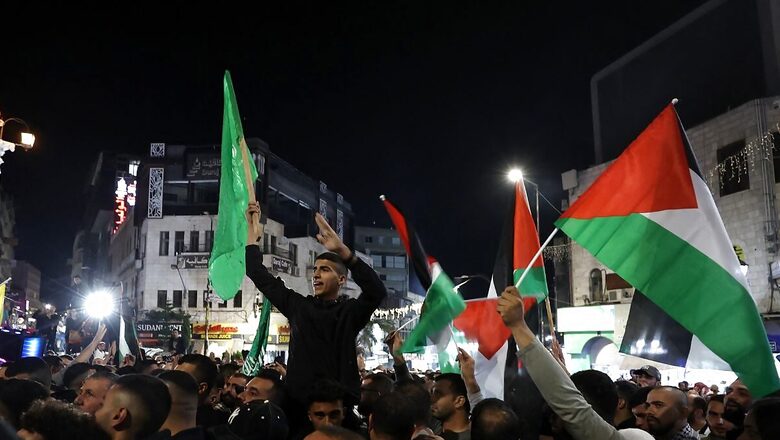
views
The demand to add Hamas to India’s terror list is mounting after the October 7 carnage by the group in Israel’s border areas adjoining the Gaza Strip of the Palestinian territory. The Hamas terror machine killed over 1,100 civilians that day, including women and children, while keeping them captive in their homes.
The Gaza Strip-based terror outfit has also abducted over 220 civilians. Hostages include women, children, and foreigners. An abducted woman from Germany was paraded naked and her body was recently found in Gaza. A young child was killed, and siblings and parents were forced to watch it.
WHY INDIA MUST DOUBLE DOWN ON HAMAS
Hamas brutality followed a pattern of extreme levels of violence like what ISIS does. The recent events say there isn’t much difference when it comes to the type of terror tools used, brutal violence perpetrated, and ideological similarities propagandised between Hamas and ISIS.
Both ISIS and Hamas, apart from targeting enemy soldiers, also target civilians with the same brutality. ISIS is notorious for beheading civilians and using its video clips as propaganda and radicalisation material. Hamas did the same with the October 7 carnage in Israel, with plenty of horrible clips available on social media platforms showing its barbarity.
Like ISIS, Hamas has started using gory videos showing extreme levels of violence combined with religious slogans as the core of the group’s outreach message to appeal to the largely inexperienced youth to get associated with it.
ISIS terror knows no boundaries. It started as an al Qaeda wing, Al Qaeda in Iraq (AQI), in 2004. In 2013, AQI became ISIS. Its chief Abu Bakr al-Baghdadi separated the group from al Qaeda in 2014, expanding his operations to a vast territory of Syria. Soon, he declared ISIS a Caliphate, with his control existing in a part of Iraq as well.
The Western world was among his target areas. Like al Qaeda, ISIS got support from individuals and institutions from wealthy Arab countries like Qatar and Saudi Arabia as per the assessment of US officials like James Stavridis, former NATO Supreme Commander. India, a country with the third-largest Muslim population globally, was also in the hit list for future extensions.
Hamas is a nation-sponsored terror group. Trained and supported by Iran and terror groups like Hezbollah, which is part of the Iran-led Axis of Resistance, the group challenges the notion of the nation-state Israel to abolish it by using violent means. The land of Israel is a Muslim land and Hamas vows to take it back, saying Jihad is the only way forward — just like the terror ideology that ISIS follows. Hamas refuses all internationally accepted deals mediated by the UN, the US, and other countries between the Palestinian Authority and Israel.
ISIS is known for radicalising people across the world using social media tools. Many Christians converted to Islam to become part of ISIS. The group found supporters across the world, including India. Hamas may follow a similar pattern.
Israel has declared war on it with a ground-level assault in the Gaza Strip. Counter operations may see Hamas terror coming down for the moment but the group is not expected to die down. Supported by Iran and regional militia, its terror tactics and operations will change the pattern. The geographically limited Hamas will look for support and recruitment abroad to emerge as more lethal. Currently, the Gaza Strip is its breeding ground for its existence and recruitment with regional extension in the area. That might change with the current Israeli counter-offensive.
Jamaat-E-Islami Kerala’s youth wing Solidarity Youth Movement organised a pro-Hamas rally on October 27 where the recorded message of a senior Hamas leader, Khaled Mashaal, was played. And this was not the first time. Event organisers say several Hamas leaders have addressed such solidarity rallies in the past and will do so in the future as well.
This gives India another reason to designate Hamas as a terror organisation, as India did with ISIS in February 2015, designating it in the MHA terror list. Apart from ISIS terror plans for India, terror recruitment was the major drive behind this decision, with some distracted youth leaving the country to join the terror organisation.
The legal mechanism available in India, under the Unlawful Activities (Prevention) Act, of 1967 gives an option for that. Chapter IV, Section 15, of the UAPA says: “Whoever does any act with intent to threaten or likely to threaten the unity, integrity, security, economic security, or sovereignty of India or with intent to strike terror or likely to strike terror in the people or any section of the people in India or any foreign country commits a terrorist act.”
WHY IS IT NOT DONE SO FAR?
India’s legal machinery includes militant groups in the terror list, based on local funding, Hawala-routed, smuggling money, local targets, and local recruitment and Hamas, currently, doesn’t fit the bill. All 44 names in the list are known for having anti-India plans even if they are based abroad like LTTE or al Qaeda or many terror groups led by Sikh extremists.
India, with a large Muslim population, has always been a target country for transnational jihadi groups like al Qaeda and ISIS to radicalise and recruit. Former prime minister Rajiv Gandhi was assassinated by LTTE in 1991 after which India became the first country to designate LTTE as a terrorist organisation in 1992.
Hamas, in the future, may target India but currently, its area of operations is limited only to the Gaza Strip and West Bank of the Palestinian territory. Hamas is still not an international and transnational terror organisation. At present, it doesn’t fit in India’s threat perception — It has no local terror, no plans, and no local recruitment apart from some Hamas videos that will be on the radar of security agencies.
Besides, categorising Hamas as a terror group will be a difficult call for India diplomatically as well.
One of the cornerstones of the foreign policy of the current government is to develop sound bilateral relations with Arab nations. To counter the Pakistani propaganda, close and friendly relations with Arab nations are a much-required investment.
The total bilateral trade between India and Arab nations is over $180 billion and growing, says data available with the Ministry of External Affairs, government of India. Over eight million Indians live in the region and are an important source of remittances back home. In 2022, India became the first country in the world to cross the $100 billion mark in receiving remittances as per the World Bank. Around 30 per cent of India’s remittances come from the Arab countries as per RBI.
Arab nations also play an important role in India’s energy security, being a major source of crude oil and gas import. According to the Ministry of External Affairs, Arab nations accounted for 60 per cent of India’s crude oil imports. Since last year, the share of crude oil import from Russia has gone higher, around 40 per cent, with the country offering discounts, but Arab nations still account for a major chunk. Similar is the case of gas imports. According to the OEC World data, India imported petroleum gas worth $21.9 billion in 2021. A total of 71 per cent of this was imported by four Arab nations with Qatar accounting for 33 per cent.
Hamas, propped up by Iran and its supported militias, gets implicit approval from many other Arab countries, including Qatar. For them, Hamas is an anti-Israeli resistance movement for the Palestinian cause. Even after the October 7 terror carnage by Hamas in Israel, just two Muslim nations — UAE and Bahrain — came forward to criticise the organisation. Many others supported Hamas. After 25 days, that cautionary stand has gone into the backdrop, with Israel’s relentless military operations to target Hamas bases killing so far over 8,500 civilians, including 3,542 children and 2,187 women in the Gaza Strip.
Hamas is not yet included in the terror list of the United Nations because of the stand taken by Arab nations and other Islamic countries only. In December 2018, US officials presented a draft resolution, “Activities of Hamas and other militant groups in Gaza” in the UN General Assembly which failed to get enough support to condemn Hamas terror. Adoption needed a two-thirds majority. A total of 87 members voted in its favour, 57 against it with 33 abstentions. If adopted, Hamas and other Palestinian groups immediately needed to cease aggressive behaviour and violent incidents. Before it, the UNGA adopted six resolutions in a week condemning Israel for its hostile stand taken on Palestine.
India has the third-largest Muslim population in the world that is sensitive to Palestinian statehood and on the humanitarian scale, India has always stood with the Palestinian people in solidarity. In its foreign policy, India historically has taken a stand in favour of the UN-mandated two-nation existence in the Palestinian Territory.
These issues create a bottleneck in India’s decision to put Hamas on its terror list — be it India’s energy security or future trade ties with Saudi Arabia and UAE as its big trade partners. Hamas is still not a big name inside India and India still maintains good ties with the Palestinian Authority and its president Mahmoud Abbas so domestic reaction is not expected to be a big problem if India does finally decide to designate Hamas as a terror group but that will not be a case with Arab nations as most of them are soft on Hamas.
Combine it with eight former Navy veterans on death row in Qatar under allegations of spying. Qatar shares close ties with Hamas and Iran, and it is reported that Hamas’s top leadership is currently staying in Qatar only. Al Jazeera, a Qatari state-owned news television network, has become an anti-Israel war channel focusing on Israeli counterattack in Gaza Strip. So, the call to decide whether Hamas be placed on the list of terrorist groups in India is going to be an uphill task.




















Comments
0 comment